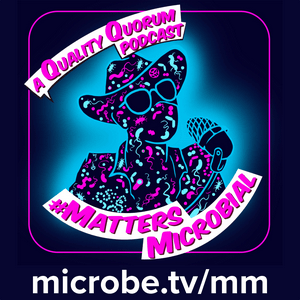Matters Microbial #90: Using Soil Microbiomes in Sustainable Agriculture May 8, 2025 Today, Dr. Francisco Dini Andreote, Assistant Professor of Phytobiomes at Penn State, joins the #QualityQuorum to tell us about the microbiome of plants and the soil, and how understanding that relationship can improve agriculture. Host: Mark O. Martin Guest: Francisco Dini Andreote Subscribe: Apple Podcasts, Spotify Become a patron of Matters Microbial! Links for this episode An overview of the Type 6 Secretory System of bacteria—almost like a microbial switchblade knife. A wonderful video of the T6SS made by a student in my own microbiology course some time ago. A video introduction to the Rhizobium-legume symbiosis and why you should care about it (by my PhD advisor from long ago, Dr. Sharon Long). A more comprehensive review article on the Rhizobium-legume symbiosis. The chemical signal of geosmin, and how it might be used by other organisms. Ecological succession in the development of sauerkraut. A must read essay by Carl Zimmer likening the human body to a number of ecological niches. The developing field of agroecology. A reminder about the “One Health” concept. Mycorrhizae and plant nutrition. Chemical communication within the soil. A fun remembrance of Norman Borlaug, who urged us to “listen” to plants. An overview of the root microbiome. The “superorganism” concept versus the “holobiome” concept.. Striga, a parasite of crop plants. Chemical communication and Striga. An interesting and relevant publication from Dr. Dini Andreote’s research group, describing how the root microbiome could help agriculture. Dr. Dini Andreote’s faculty website. Dr. Dini Andreote’s very wonderful research team website. Intro music is by Reber Clark Send your questions and comments to
[email protected] 